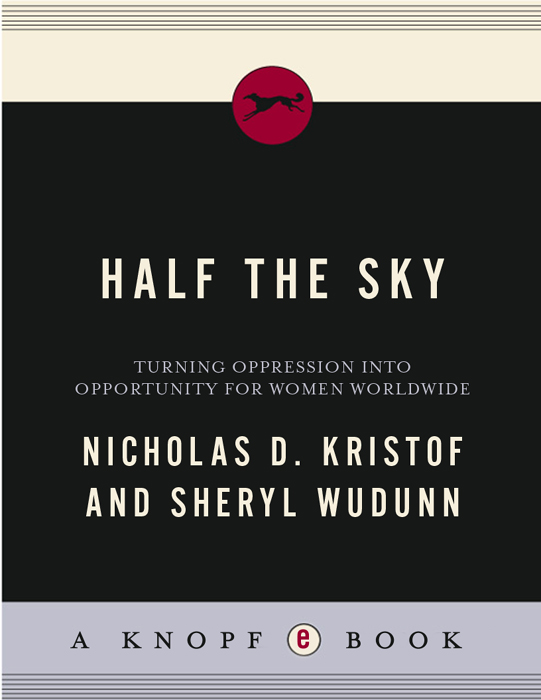
Half the Sky
فرمت کتاب
ebook
تاریخ انتشار
2009
Lexile Score
1170
Reading Level
8-9
ATOS
9.5
Interest Level
9-12(UG)
نویسنده
Sheryl Wudunnشابک
9780307273154
- اطلاعات
- نقد و بررسی
- دیدگاه کاربران
نقد و بررسی

Starred review from August 17, 2009
New York Times
columnist Kristof and his wife, WuDunn, a former Times
reporter, make a brilliantly argued case for investing in the health and autonomy of women worldwide. “More girls have been killed in the last fifty years, precisely because they were girls, than men were killed in all the wars of the twentieth century,” they write, detailing the rampant “gendercide” in the developing world, particularly in India and Pakistan. Far from merely making moral appeals, the authors posit that it is impossible for countries to climb out of poverty if only a fraction of women (9% in Pakistan, for example) participate in the labor force. China's meteoric rise was due to women's economic empowerment: 80% of the factory workers in the Guangdong province are female; six of the 10 richest self-made women in the world are Chinese. The authors reveal local women to be the most effective change agents: “The best role for Americans... isn't holding the microphone at the front of the rally but writing the checks,” an assertion they contradict in their unnecessary profiles of American volunteers finding “compensations for the lack of shopping malls and Netflix movies” in making a difference abroad.

June 15, 2009
A Pulitzer Prize–winning husband-and-wife reporter team track the growing movement to empower women in the developing world.
Kristof and WuDunn (Thunder from the East: Portrait of a Rising Asia, 2000, etc.) traveled through Africa and Southeast Asia meeting with victims of sex trafficking, forced prostitution and various forms of gender-based neglect and violence, as well as interviewing those who are making a difference in the lives of impoverished and abused women. While they provide historical background and cite grim statistics to back their claims of oppression, the impact of their report comes from the personal stories of remarkable women, such as Mukhtar Mai, a Pakistani woman who was gang-raped. Instead of killing herself as was expected by her culture, she fought back, won compensation and is using the money to build a girls' high school. The authors argue that fighting back is key and that education that will empower women is crucial to changing culturally embedded attitudes. Along with the success stories, Kristof and WuDunn report on the failure of large-scale international aid, which often comes in the form of what they term"tree-top" projects as opposed to grassroots efforts. The authors are especially effective at getting women to speak openly about their lives, and they do not hesitate to write about unpleasant facts, bad outcomes and unintended consequences: Women are often the abusers of other women; women freed from brothels sometimes return for drugs or money; introduction of a cash crop to help women earn money for their families can end up polluting the environment. Also noteworthy is the authors' willingness to say what is politically incorrect: When microloans are made to men, the money is likely to go toward instant gratification—alcohol, drugs and prostitutes—while women are more apt to spend it on family health and educating children. Pointing out that the emancipation of girls enabled China's economic surge and that the status of women is"the greatest handicap of Muslim Middle Eastern societies today," Kristof and WuDunn forcefully contend that improving the lot of girls and women benefits everyone. They conclude with specific steps that individuals can take to support the empowerment movement.
Intelligent, revealing and important.
(COPYRIGHT (2009) KIRKUS REVIEWS/NIELSEN BUSINESS MEDIA, INC. ALL RIGHTS RESERVED.)

July 1, 2009
Despite an estimated 107 million women and girls missing in the world population due to every form of abuse, from infant neglect to honor killings, gendercide receives none of the coverage and outrage of other human-rights violations, lament these two Pulitzer Prizewinning journalists. The husband-and-wife team chronicles the horrific abuses suffered by girls and women: sold into sex slavery, abused and exploited as workers, beaten and killed to protect male honor, and generally denied education, medical attention, and food reserved for boys and men. The authors focus on sex trafficking, gender-based violence (including honor killings and mass rape), and maternal mortality. They also examine the economic forces at work that promise more opportunities, along with required education and resulting autonomy, for female workers and entrepreneurs as developing countries recognize how they waste this valuable resource. Kristof and WuDunn reinforce the truth behind the terrible statistics with passionately reported personal stories of girls and women (including photographs) and efforts to help them, including a final chapter suggesting how readers can help.(Reprinted with permission of Booklist, copyright 2009, American Library Association.)




دیدگاه کاربران